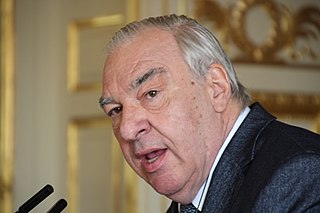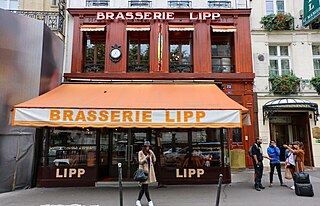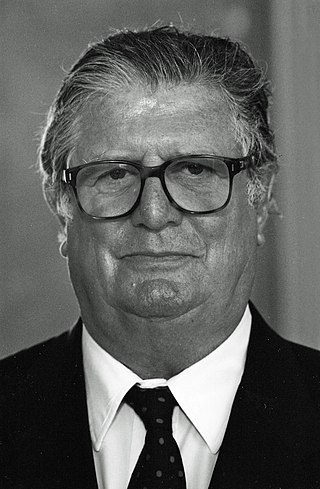Related Research Articles

The Prix Goncourt is a prize in French literature, given by the académie Goncourt to the author of "the best and most imaginative prose work of the year". The prize carries a symbolic reward of only 10 euros, but results in considerable recognition and book sales for the winning author. Four other prizes are also awarded: prix Goncourt du Premier Roman, prix Goncourt de la Nouvelle, prix Goncourt de la Poésie (poetry) and prix Goncourt de la Biographie (biography). Of the "big six" French literary awards, the Prix Goncourt is the best known and most prestigious. The other major literary prizes include the Grand Prix du roman de l'Académie française, the Prix Femina, the Prix Renaudot, the Prix Interallié and the Prix Médicis.

Count Jean Bruno Wladimir François-de-Paule Lefèvre d'Ormesson was a French writer and novelist. He authored forty books, was the director of Le Figaro from 1974 to 1977, as well as the dean of the Académie Française, to which he was elected in 1973, until his death, in addition to his service as president of the International Council for Philosophy and Humanistic Studies within UNESCO (1992–1997).

Michel Serres was a French philosopher, theorist and writer. His works explore themes of science, time and death, and later incorporated prose.

Edgar Morin is a French philosopher and sociologist of the theory of information who has been recognized for his work on complexity and "complex thought", and for his scholarly contributions to such diverse fields as media studies, politics, sociology, visual anthropology, ecology, education, and systems biology. As he explains: He holds two bachelors: one in history and geography and one in law. He never did a Ph.D. Though less well known in the anglophone world due to the limited availability of English translations of his over 60 books, Morin is renowned in the French-speaking world, Europe, and Latin America.

Max Gallo was a French writer, historian and politician. He wrote over one hundred books.
Fayard is a French Paris-based publishing house established in 1857. Fayard is controlled by Hachette Livre.
Pierre Chaunu was a French historian. His specialty was Latin American history; he also studied French social and religious history of the 16th, 17th, and 18th centuries. A leading figure in French quantitative history as the founder of "serial history", he was professor emeritus at Paris IV-Sorbonne, a member of the Institut de France, and a commander of the Légion d'Honneur. A convert to Protestantism from Roman Catholicism, he defended his far-right views most notably in a longtime column in Le Figaro and on Radio Courtoisie.

Didier Decoin is a French screenwriter and writer awarded the Prix Goncourt in 1977.

The Albert Londres Prize is the highest French journalism award, named in honor of journalist Albert Londres. Created in 1932, it was first awarded in 1933 and is considered the French equivalent of the Pulitzer Prize. Three laureates are awarded each year. The three categories are : "best reporter in the written press", "best audiovisual reporter" and "best reporting book".

The Grand prix des lectrices de Elle is a French literary prize awarded by readers of Elle magazine.

Brasserie Lipp is a brasserie located at 151 Boulevard Saint-Germain in the 6th arrondissement of Paris. It sponsors an annual literary prize, the Prix Cazes, named for a previous owner.
The Prix Maison de la Presse is an annual French literary prize, established in 1970 by the Syndicat national des dépositaires de presse (SNDP) and Gabriel Cantin. Until 2005 it was known as Prix des Maisons de la Presse and given out in the two categories Novel (Roman) and Non-Fiction (Document), after which the name was changed and the categories merged into one.

Jean-Louis Servan-Schreiber was a French journalist. He was the co-founder of L'Expansion and the founder of Psychologies and Radio Classique. He was the author of several books.

Christiane Collange was a French journalist and author.

Jean-Paul Goujon is a French university professor and writer.
Stéphane Denis is a French journalist and writer.
The prix Breizh is a French literary award bestowed under this name since 2001, on the initiative of Gwenn-Aël Bolloré. On that date, it succeeded the "Prix Bretagne" created in 1961. It crowns each year an author of Breton origin or friend of Brittany.
Franck Maubert is a French novelist and essayist. Maubert is the author of three novels and several works devoted to painting and song. He was a juror in the 2015 prix Françoise Sagan.
Jean Chalon is a French journalist and writer. He first hesitated before a career as a Spanish teacher before deciding for journalism. He has spent most of his career at Le Figaro.

Jean-Claude Fasquelle was a French publisher.
References
- ↑ "Jean Bothorel". Bibliothèque nationale de France . Retrieved October 4, 2016.
- 1 2 3 "Jean Bothorel viré par "le Figaro"". Libération. July 2, 1996. Retrieved October 4, 2016.
- ↑ "Tous les lauréats (par année)". Académie Goncourt. Retrieved October 4, 2016.
- ↑ "opa-de-vincent-bollore".